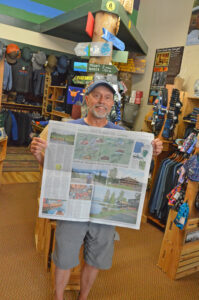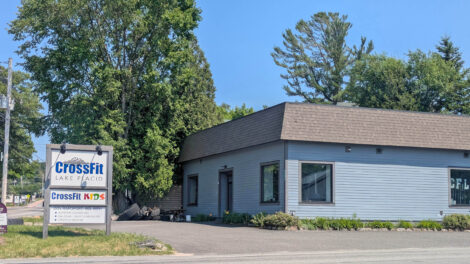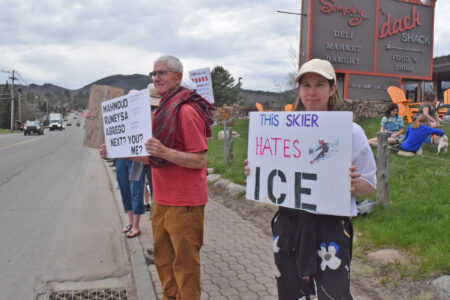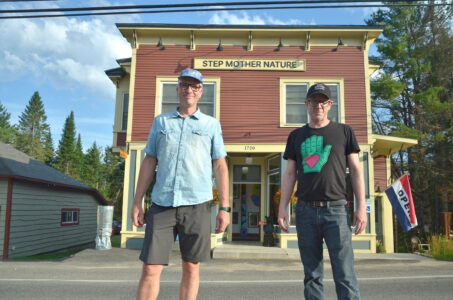New Ironman Task Force plans community survey

An Ironman Lake Placid triathlete gives a thumbs up prior to the swim portion of the 2014 race. (Enterprise photo — Andy Flynn)
LAKE PLACID — The Ironman Task Force, a committee created this summer to evaluate the economic and community impacts of the Lake Placid Ironman triathlon, met for the first time on Tuesday.
During its organizational meeting, the committee, which includes members from each of the municipalities the triathlon course runs through, agreed that the group’s top priority moving forward should be transparency and engagement with the communities effected by the race.
Ironman organizers want to continue the Lake Placid triathlon beyond 2022. In July, officials from the town of North Elba, village of Lake Placid and Regional Office of Sustainable Tourism signed a one-year contract extension with Ironman to allow the triathlon to return in 2022. They also created a task force on Ironman after hearing pros and cons about the contract extension during a virtual public meeting with ROOST. When the contract extension was announced two days prior to this year’s race, ROOST stated in a press release that the task force would “address issues surrounding the event while looking for ways to improve community benefits.”
Now, that task force is seeking widespread community input before they make a recommendation on whether this region should continue to host the race beyond 2022, and, if it does, what the terms should be.
To gather this more open-ended community feedback, the task force elected ROOST to design a survey to disseminate among the taxpayers of Lake Placid, North Elba and all other municipalities effected by the race and the months of training that surround it.
The survey will include under 10 questions and will consider residents and small business owners, offering opportunities to identify what they personally feel are the pros and cons of the race.
Additionally, the committee will consider performing its own research on the economic benefits and downfalls the race brings to local communities and businesses. Ironman releases an economic study at the end of each race, but if the task force determines the last Ironman study is inadequate, they hope to work with Ironman officials to supplement that research with more accurate information on potential local economic benefits. The last locally executed economic impact statement for Ironman, done in part by ROOST, was in 2005, according to ROOST CEO Jim McKenna.
McKenna said the task force is expected to deliver a recommendation by November whether Lake Placid should continue to host Ironman, but Lawrence said the committee is prepared to allow more time for the recommendation for “due diligence until it’s done.”
The task force will review the community survey questions at their next meeting on Oct. 5 before sending the survey out to locals. After the survey comes back, the task force plans to evaluate the data to better understand what community members see as pros and cons of the race. The task force will then present this information to elected officials in Lake Placid, North Elba, Keene, Jay and Wilmington, who will then come to a decision with ROOST on whether this region will continue to host the triathlon.
–
More community, less competition
–
Community members who weighed in on the triathlon over the summer were mixed on Ironman. Some felt the economic benefits of the race no longer outweigh what they see as negative community impacts — such as traffic disruption on race day and while athletes are training ahead of time. Others felt the economic benefits, and other positives — like seeing the triathlon happen — outweigh any negatives.
Except last summer, when the event was canceled because of the pandemic, Ironman has held a race in Lake Placid every summer since 1999.
The task force’s organizational meeting, held virtually on Zoom, was moderated by ROOST Chief Operating Officer Mary Jane Lawrence. McKenna was on the call as well.
Several members of the committee brought up that community involvement was more present in the early days of the race, when Ironman Lake Placid founder Graham Fraser was still operating the race. They said that’s what’s been missing in recent years.
Lawrence said Fraser gave the task force good recommendations for the race over the summer, and the committee agreed his presence in future meetings would be valuable. But even without Fraser present, the committee kept circling back to the need to reignite community involvement in the race.
Dorine Peregrim, a four-time Ironman competitor and North Elba resident who lives on the Ironman course, said she’s watched community involvement in the race dwindle over the last 10 years. She even said that some of her neighbors leave town when the race occurs so they can avoid the commotion.
“The majority of local people are fed up, and it’s sad,” Peregrim said.
She said she thinks that’s because locals feel like they aren’t included or have a say in the race.
Sue Young, an artist in Jay, said even the athlete’s application to compete in the event is “very disconnected” from the communities along the course. Young said that in the future, the race should have a more “farm-to-table” connectivity to get competitors more engaged and interested in the local scene.
North Elba town Councilor Richard Cummings said that when Fraser ran the race, many competitors were so impressed by the area and community that they’d return with their families for vacations.
After Woody mentioned compiling a list of community-proposed changes to the race to present to Ironman, McKenna agreed that locals may have more power than they think “to alter this thing” for the better.
Lawrence also noted that she feels the committee and community should think outside the box, considering alterations to how the race has run in recent years instead of feeling tied to an ultimatum of complete rejection or as-is acceptance.
–
Task force members
–
The Ironman Task Force was created by ROOST and is composed of community members who live or work along the race course.
Members were selected based on recommendations by business owners and the involved municipalities, and on the members’ longstanding engagement in the Ironman discussions with ROOST via email, according to Lawrence. The task force is led by McKenna and Lawrence. Other members of the committee are:
¯ Ann O’Leary, Lake Placid resident
¯ Trish Friendlander, Lake Placid resident
¯ Bryan Magnus, Lake Placid resident
¯ Tara Wright, Lake Placid resident
¯ Dorine Peregrim, Lake Placid resident
¯ Hannah Grall, Keene resident
¯ Julie Woody, Keene resident
¯ David Nye, Keene resident
¯ Cheri Cross, Jay resident and co-owner of the Jay Craft Center
¯ Sue Young, Jay resident and artist
¯ Jay Ward, Jay resident and CEO of Ward Lumber
¯ Charlie Terry, Wilmington resident
¯ Michelle Preston, Wilmington resident and head of the Whiteface Visitors Bureau
¯ Lake Placid village Trustee Peter Holderied
¯ North Elba town Councilor Richard Cummings
¯ Greg Borzilleri, Ironman Lake Placid race director




